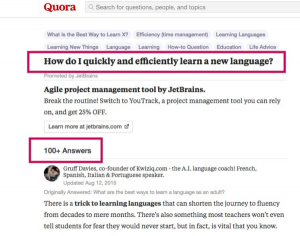 You’ve bid you time for the last several years on a job that’s become stale and largely unfulfilling, just waiting until you were convinced that the job market was indeed improving, that the apparent recovery is for real. Clearly, your career is definitely in the “stall” mode, so you decide now may in fact be a good time to test the waters—it is!—while, at the same time, being careful to avoid doing anything that could jeopardize your current job while you’re looking. (Hey! You still have to eat and be able to pay the bills while searching for a new job!)
You’ve bid you time for the last several years on a job that’s become stale and largely unfulfilling, just waiting until you were convinced that the job market was indeed improving, that the apparent recovery is for real. Clearly, your career is definitely in the “stall” mode, so you decide now may in fact be a good time to test the waters—it is!—while, at the same time, being careful to avoid doing anything that could jeopardize your current job while you’re looking. (Hey! You still have to eat and be able to pay the bills while searching for a new job!)
Enter the “stealth” job search!
How should you conduct a stealth job search? Short, easy answer: Very, very carefully. If you’re currently employed and word should leak out at your current employer that you’re “looking,” you could very easily, and very quickly, find yourself unemployed, making it a whole lot harder, not to mention far more of a pressing issue, to land a new job.
KEEP YOUR NEW JOB SEARCH TO YOURSELF!
As you conduct a stealth job search, the number one priority is for you to keep your plans and intentions strictly to yourself. If the wrong person learns of your plans, you could summarily be called in to your boss’s office to explain your “indiscretions” and perhaps be shown the nearest exit.
Who would leak such information about you? Actually, just about anyone, and they could do it either quite innocently or with considerable malice aforethought. Why? Jealousy. Envy. In an attempt to curry favor with the boss. Really, for any number of reasons. Remember, too, any secret you have is no longer a secret once you tell just one other person!
Am I being paranoid here? No, just reporting on human nature. Am I saying (or even implying) that, if you are looking, you should trust absolutely no other person with the news, not even your “best friend” at work? Yes, as a matter of fact that is precisely what I am saying. Keep the fact that you are looking strictly to yourself. Period.
KEEPING YOUR STEALTH JOB SEARCH STEALTHY
While no system or approach is absolutely foolproof, the best ways to ensure that your stealth job search remains under the company’s (and your boss’s) “radar” include the following:
- Make sure that ALL of your job search activities, e.g., making photocopies, “polishing” your cover letter and your résumé, “surfing” the Internet job boards, making and returning phone calls regarding your search, etc., are conducted on your own time and on your own dime. That is, conduct all activities off company premises, and use your own personal computer, tablet, Smartphone, iPhone, etc., to conduct your search—not the company’s.
- Do NOT call in sick or fabricate meetings outside the office to attend job interviews. If you need time off, take vacation time or use personal days. If questioned about such authorized time off, merely say that you have to deal with personal matters and leave it at that.
- Never, never, never use your current employer’s telephone number as your contact number. Use your home telephone and/or your cell phone number as your contact number. (That doesn’t mean, however, that you conduct your job search activities on company premises using your cell phone!)
- Don’t use your business email address. (Many companies today routinely monitor employee email correspondence and usage.) If you don’t already have a personal email address, then get one. They’re usually free.
- Check the “anonymity level” of any online sites where you will be posting your résumé and/or submitting job applications. (LinkedIn can normally be considered a “free-fire zone” because most professionals have a presence on the site and that presence usually is perceived as merely innocent, professional networking activity. You should avoid, however, including something like this in your LinkedIn profile headline: “Open to new opportunities,” “Seeking new opportunities,” etc.
- Instead of using your specific home address on your résumé, consider using a more generic address. For example, if your address is 123 Flower Street, Cleveland, OH, use “Suburban Cleveland, OH.”
- Disguise the name and location of your current employer by using a general description and location. State Farm Insurance Companies, headquartered in Bloomington, IL, could become “A major multi-line insurer headquartered in the Midwest.”
- Network very, very carefully. As a general rule, you should limit your networking activities to those professionals who are outside of your current employer. On the other hand, it is certainly acceptable to approach others, say, at professional meetings or after-hours business get-togethers. Do NOT, though, use an approach such as this: “I hate my current job and will go about anywhere just to take another job!” Instead, say something along these lines: “While I am certainly doing well at my current position, I am always open to genuine opportunities to take my career to the next level. Do you have any suggestions or know anyone I should be talking to?”
- Select your references very, very carefully. Normally, of course, you won’t be able to provide the names of previous bosses and/or colleagues at your current employer as references. Instead, consider using the names of bosses/colleagues at previous employers.
- Watch what you say on or post to your online social sites. While you may be laboring under the impression (false!) that such social sites are “personal,” many times they are anything but!
EMPLOYERS/BOSSES ON MUCH HIGHER ALERT TODAY
During the extremely tight job market of recent years, bosses and the companies they worked for weren’t really all that concerned about significant numbers of employees looking for new jobs. They knew, or at least believed, that most employees were glad to still have a job during those turbulent times and pretty much took for granted that most would stay put in their current positions. Let me assure you, with the burgeoning job market of today, things definitely have changed!
As a result of increased—and increasing—movement across virtually the entire job market landscape, companies and bosses are on much higher alert to detect—and deal with—possible employee defections. That means, then, that if you are now looking, or intend to begin looking, you also need to be on higher alert to any potential fallout that might occur if your plans are revealed before you are ready to reveal them. When is that time? When you go in to your boss’s office and submit your resignation to take a great new job!
(261)
Report Post








